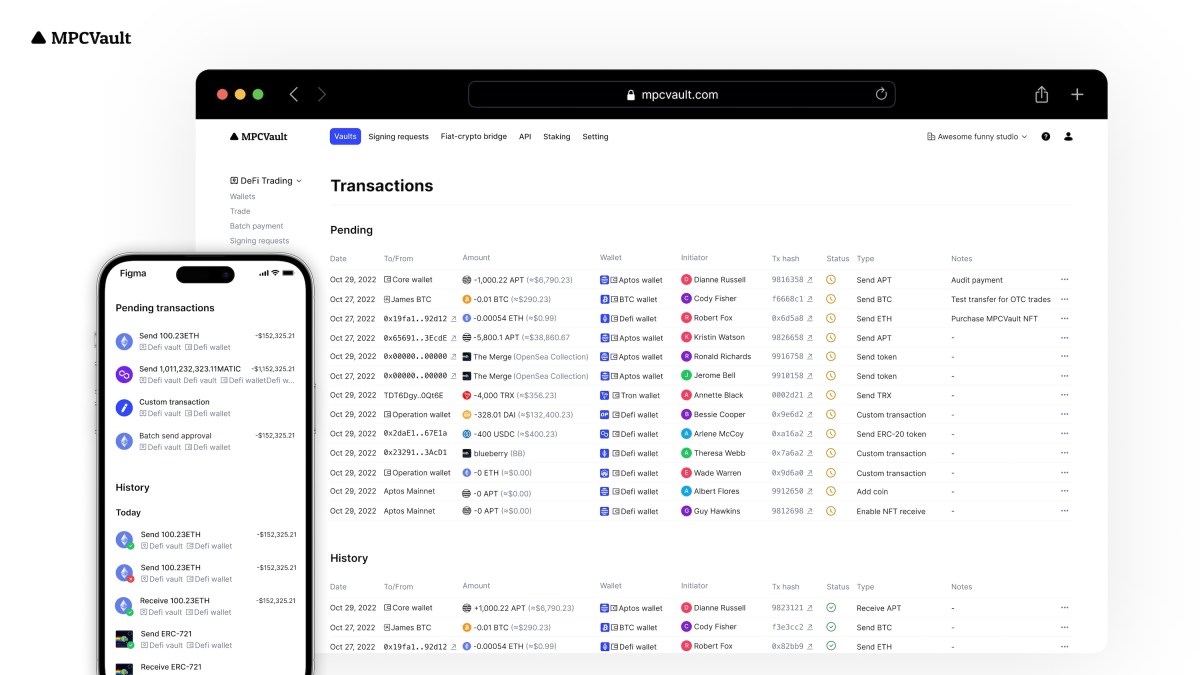Business
MPCVault’s crypto wallet for businesses hits $500M AUM in 7 months

While a plethora of products have been developed to meet the crypto needs of consumers, there are limited options designed to assist enterprises in managing digital assets. Many businesses thus find themselves storing a significant amount of cryptocurrency in centralized exchanges and self-custodial wallets that are ill-suited for enterprise requirements, akin to a business utilizing a consumer bank to manage its finances.
Recognizing this gap, Jason Li and his co-founders established MPCVault, which offers non-custodial, multi-signature crypto wallets as a service with the goal to serve crypto businesses similar to an enterprise bank catering to traditional businesses.
The addressable market is potentially enormous, according to Li. The founder cited one research, which estimated that stablecoins settled more than $7 trillion in value last year, not far off from Visa’s $12 trillion given the new asset class hasn’t been around long.
The success of MPCVault of course hinges partly on the state of the crypto industry — which has yet to recover after a major crash in token prices and trading volume and is seeing plunging VC funding. But there continues to be a substantial volume of business-to-business transactions, as indicated by customer data from MPCVault, Li said.
MPCVault completed a $3 million seed funding round in March 2022, which hasn’t been disclosed before. Headquartered in Sunnyvale, California with offices in London and Singapore, the startup raised money from Fenbushi Capital, Tess Ventures, Youbi Capital, and angels including Joe Chen, the founder of China’s early-day Facebook equivalent Renren, and Shuhong Ye, former CFO of China’s food delivery giant Meituan.
Since launching its multi-sig wallet service in January, the startup has surpassed $500 million in assets under management and has moved over $1 billion in assets. It boasts more than 100 institutional customers, including crypto exchanges, venture capital firms, and other kinds of web3 projects.
Non-custody, multi-sig
Being non-custodial means that users, rather than MPCVault or any other centralized party, retain complete control over their wallet keys, a feature that is increasingly sought after as centralized wallets lose credibility.
“Companies like FTX and Celsius had qualified custody licenses, but things still went wrong, so the market is now starting to understand the importance of non-custody, why you must be able to see your own money, and why the platform shouldn’t be able to move your funds,” Li said in an interview with TechCrunch.
Following the FTX incident, which revealed the mismanagement of customer funds by the exchange, many businesses turned to the cold wallet Ledger and other self-custody mobile solutions to store cryptocurrencies. But Li pointed out that “not everyone can use these solutions very safely.”
While many consumer crypto wallets require just one private, encrypted key to authorize transactions, business decisions often involve approvals from multiple parties for internal control. “It is undesirable for any single individual to have access to the full private key, as they would have unfettered access to all assets,” Li suggested. “There needs to be redundancy built in for handling private keys since it is not difficult for people to lose the 24-word seed phrase.”

Co-founders of MPCVault: Jason Li (CEO) and Webster Bei (CTO). Image: MPCVault
To solve the problem, MPCVault’s wallets employ multi-party computation algorithms and offer transaction approval policies, meaning users don’t have direct access to the full private key and can set up policies that ask for several signatures before a transaction goes through.
Aside from safeguarding keys, an enterprise-facing wallet should also provide protection for client assets in a manner that web2 antivirus software works to protect users from attacks, reckoned Li. To that end, MPCVault’s wallet solution comes with a security layer that scans for phishing URLs, detects suspicious behavior, checks for interacted addresses, and performs semantic analysis and transaction simulation to help users understand what transactions they are actually signing.
Crypto banking
While the traditional banking system provides a wide range of products tailored to security, payments, wealth management, and other use cases, the crypto banking sector lacks many of these toolsets, argued Li. MPCVault’s goal is to become the “financial operating system for crypto businesses,” or simply, the PayPal of crypto, with services ranging from multichain wallets and salary payments to reconciliation and statement reporting.
Crypto banking is fundamentally different from traditional banking, which calls for the development of new infrastructure to manage assets. In the traditional web2, world, only a few individuals in a company would handle money, Li pointed out. In web3, however, almost everyone on the team will need to interact with a blockchain as crypto wallets serve purposes beyond financial transactions.
A startup’s business development team, for example, may need to use a shared wallet to access the firm’s social account; the marketing department may require a wallet to engage with other protocols; and the operational team may oversee another wallet that manages the company’s daily expenses.
While traditional banks deal primarily with fiat currencies, crypto banks handle private keys that facilitate asset movement on blockchains. Therefore, instead of obtaining regulatory licenses to operate various currencies, MPCVault focuses on “protecting cryptographic keys” and “implementing complex mathematical algorithms,” said Li.
When it comes to competition, Li pointed out that while there are institutional wallets out there, none of them is currently catering to small and medium-sized businesses. He also believed his team holds a technical advantage due to the challenge of building a team with expertise in traditional web security, cryptography, mathematics, computation, cloud infrastructure, and front-end user experience all at once.
“Who’s going to use a wallet if it doesn’t come with all these capabilities?”
-

 Entertainment6 days ago
Entertainment6 days agoWhat’s new to streaming this week? (Jan. 17, 2025)
-

 Entertainment6 days ago
Entertainment6 days agoExplainer: Age-verification bills for porn and social media
-

 Entertainment5 days ago
Entertainment5 days agoIf TikTok is banned in the U.S., this is what it will look like for everyone else
-

 Entertainment5 days ago
Entertainment5 days ago‘Night Call’ review: A bad day on the job makes for a superb action movie
-

 Entertainment5 days ago
Entertainment5 days agoHow ‘Grand Theft Hamlet’ evolved from lockdown escape to Shakespearean success
-

 Entertainment5 days ago
Entertainment5 days ago‘September 5’ review: a blinkered, noncommittal thriller about an Olympic hostage crisis
-

 Entertainment5 days ago
Entertainment5 days ago‘Back in Action’ review: Cameron Diaz and Jamie Foxx team up for Gen X action-comedy
-

 Entertainment5 days ago
Entertainment5 days ago‘One of Them Days’ review: Keke Palmer and SZA are friendship goals




















